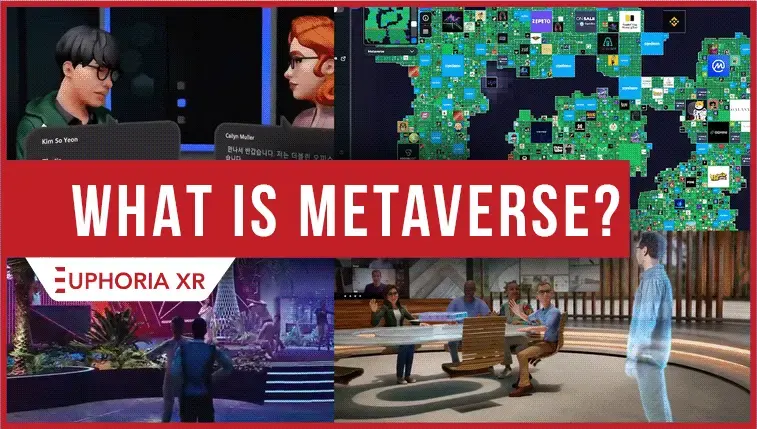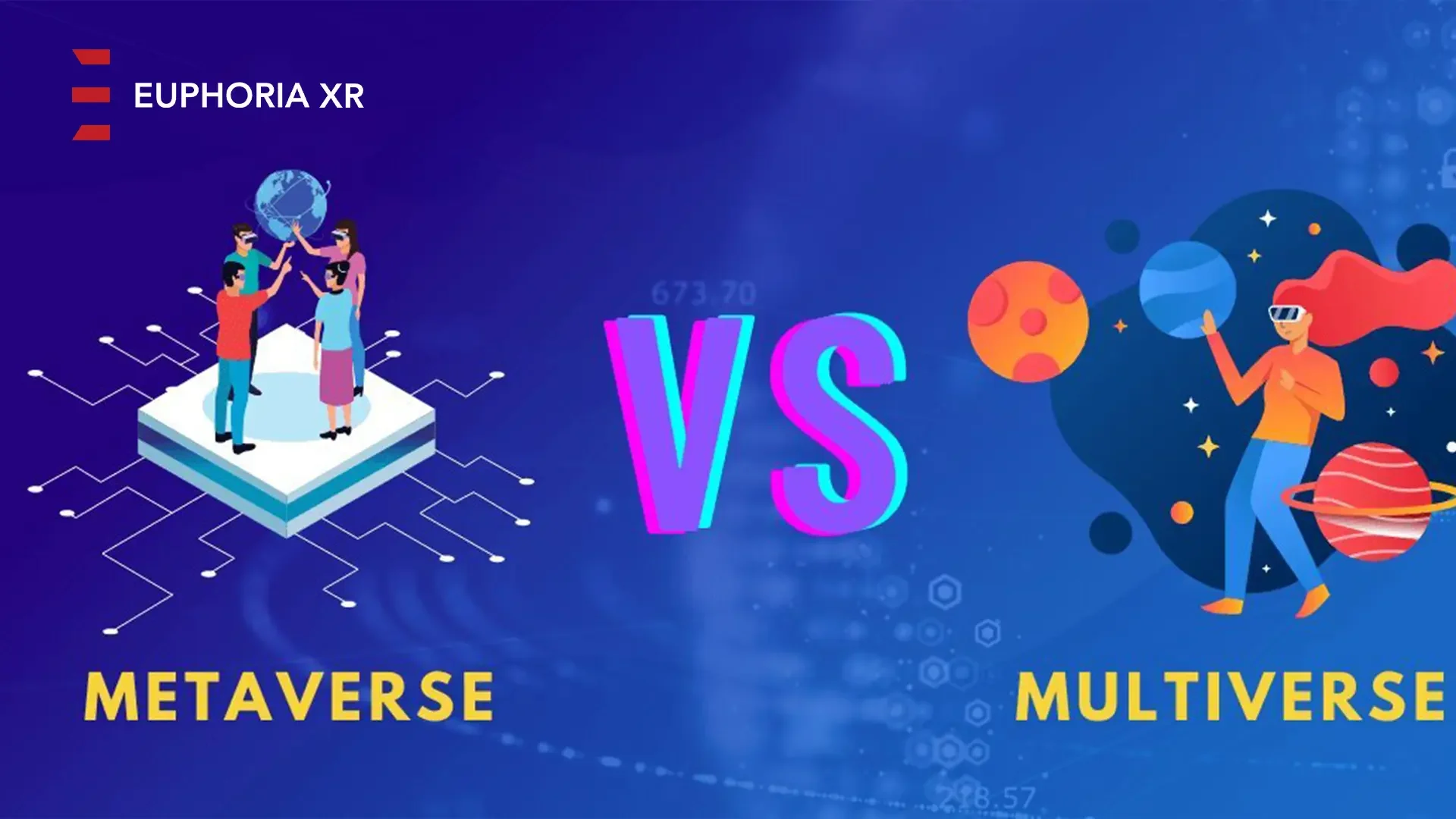Have the recent adventures of Doctor Strange caused you to become immersed in the multiverse craze? There are other places where realities collide besides the movie. The metaverse and the multiverse are two “M”-heavy topics that are gaining much attention in the real world.
They are not the same, even if they both include virtual worlds. Confused? You are not alone. According to SEMrush’s report, search interest for “metaverse vs. multiverse” has risen by 50% in the past year, suggesting that people are becoming more interested in and curious about these ideas. We have got you covered, so don’t worry. In this article, we will clarify the distinctions between the multiverse and the metaverse.
“Now the question is, what’s the main difference between the Metaverse and Multiverse?”
Simply put, the metaverse is a single digital world that permits users to learn, play, shop, and learn. In contrast, the multiverse is a collection of different, separate digital spaces with distinguished traits and features. That said, there’s so much more to these concepts than these simple definitions. Next, we’ll dive deeper into the definition of the metaverse and the multiverse and how they work on different approaches. In this way, we can completely capture their essence and value for customers and brands in the digital environment.

Defining the Metaverse
Neal Stephenson popularized the word “Metaverse” in his science fiction novel “Snow Crash” in 1992. The book describes a shared virtual environment that is produced when physically persistent virtual worlds and virtually augmented physical reality collide. In the modern period, the term “Metaverse“ has gained popularity in the IT community, denoting a networked virtual environment where users can instantly communicate with one another and virtual objects.
Statista’s 2023 Survey shows that the global metaverse market was projected to be 65.5 billion USD in 2022. This is predicted to increase to 82 billion US dollars in 2023 and then rise to 936.6 billion US dollars by 2030.
Imagine the Metaverse as a single, vast virtual environment, similar to a network of linked virtual places. Virtual marketplaces, learning centers, and social media sites are a few examples of these spaces. By combining virtual and real experiences, companies like Facebook (now Meta) hope to create a single digital world that can be accessed on a variety of devices as part of their “metaverse” goal.
Defining the Multiverse
Conversely, the idea of a Multiverse exceeds the boundaries of a single Metaverse. The Multiverse imagines several parallel universes or realities, each with its laws of physics, residents, and regulations, instead of a single cohesive digital world. The Multiverse theory, which postulates the presence of several universes existing concurrently, is the theoretical underpinning of this idea.
Within virtual spaces, the Multiverse refers to an abundance of linked or separate virtual worlds, each providing distinct surroundings and experiences. Themes, genres, and even underlying technologies can differ throughout these universes. Interactive gaming systems such as Roblox and Fortnite present aspects of the Multiverse, allowing players to enter into various virtual worlds within a unified framework.
Difference between Metaverse and Multiverse
Now, you have a basic understanding of the two concepts: Metaverse and Multiverse.
The Metaverse is a networked virtual environment where users can easily move between different locations according to their needs. However, users cannot easily move between virtual worlds because the Multiverse comprises different, disconnected digital ecosystems.
There is a widespread misperception regarding the distinctions between the ecosystems of the Metaverse and Multiverse. Users may encounter a variety of unrelated ecosystems in the Multiverse. The Metaverse, on the other hand, functions as a single digital hub where people can easily move between different events, video games, and experiences. To enjoy integrated experiences, users can access the Metaverse via their PC or augmented reality devices such as Google Glass.
Let’s examine the main differences between the Metaverse and the Multiverse so that you can better understand their differences.
1. Ownership and Organization
Metaverse:
A lasting, decentralized structure exists in the metaverse. Visualize a digital republic in which citizens may own property in the virtual world and participate in governance. Consider purchasing businesses or virtual land in the metaverse.
Multiverse:
The multiverse is more fragmented nowadays. The corporations that established the virtual worlds own those areas and their assets. It’s comparable to having accounts or games on different platforms.
2. Identity and Continuity
Metaverse:
Your digital identity and permanent avatar are important components of the metaverse. Moreover, you can make a single character capable of existing outside of many metaverse experiences. Your avatar’s look, belongings, and reputation stay with you everywhere.
Multiverse:
In the present multiverse, certain virtual areas are linked to your identity and belongings. You might be an experienced warrior in one game, but you might be a newcomer in another. Your accomplishments and belongings might not transfer over between them.
3. Uniformity and Compatibility
Metaverse:
The metaverse aims for open standards and interoperability, which implies smooth interactions between various metaverse experiences and platforms. Consider using virtual goods or money in different metaverse applications.
Multiverse:
There are currently no such standards throughout the multiverse. Every platform has its own set of regulations, money, and item systems. It’s comparable to utilizing various currencies in various nations.
4. Future
Metaverse:
The growth of the metaverse depends on developments in blockchain, virtual reality, and augmented reality. It’s a long-term plan, and there needs to be more disagreement on how it will be constructed and run.
Multiverse:
In its more basic form, the multiverse already exists. Virtual platforms and current online games can be considered stepping stones toward a more integrated future metaverse.
Are the Multiverse and Metaverse Really Different?
Are the terms “multiverse” and “metaverse” really different? When we realize how different they are from one another, we can see that although the Multiverse is made up of multiple virtual worlds, the Metaverse is a single, shared area where all digital activity takes place. But is the Metaverse truly able to operate as a single universe?
Such singularity is the goal of Mark Zuckerberg’s Metaverse vision, but it runs the risk of being centralized; a Metaverse driven by a single platform is probably controlled by a single entity, which is at odds with the values that support Web 3.0 and Blockchain. Their goal is to create a decentralized Metaverse that is free from centralized authority and offers complete user liberty and transparency.
The idea of a centralized Metaverse represents one viewpoint. However, decentralization is necessary for global social inclusion. A single-universe approach to a decentralized metaverse is unable to support the wide range of current and upcoming metaverse initiatives. So, how do we resolve this conflict?
To create a coherent experience, several decentralized initiatives are combined in the multiverse method for metaverse development. This strategy aligns with the values of decentralization, united engagement, and democracy. Therefore, we may say that the multiverse acts as an intermediary for developing decentralized metaverse initiatives, which eventually come together to actualize the idea of a single, unified decentralized metaverse.
Final Words!
The metaverse may not have a clear future, but recognizing all of its capabilities will require a multiverse strategy that values interoperability. The subject of metaverse development is expanding and offers numerous prospects. Our team of specialists can provide guidance if you’re trying to build an interesting metaverse app and want to take advantage of this trend.
Get in touch with us right now to discover how our Metaverse development Company may help you build a successful virtual environment and meet your income targets.














